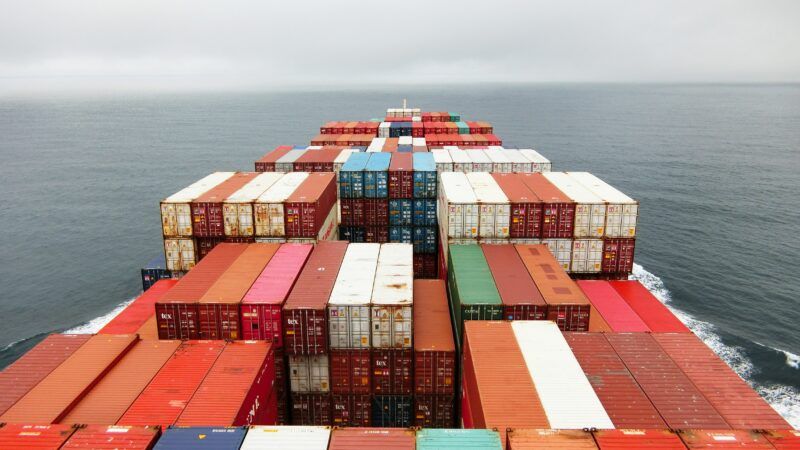Tariffs on Chinese Imports Have Accomplished Approximately Nothing
A new study shows that former President Donald Trump's tariffs did little to push American companies out of China.

At the core of former President Donald Trump's aggressive trade policies was a relatively simple—perhaps overly simplified—promise: Tariffs on Chinese-made products would drive manufacturers out of China.
"Many tariffed companies will be leaving China for Vietnam and other such countries in Asia," Trump claimed in May 2019, about a year after his tariffs were first imposed. "China wants to make a deal so badly. Thousands of companies are leaving because of the Tariffs," he tweeted a few months later, suggesting that the outflow was already underway. "If you want certainty, bring your plants back to America," Robert Lighthizer, Trump's U.S. trade representative, lightly threatened in a New York Times op-ed in May 2020, as the trade war's second anniversary arrived.
But the tariffs failed to achieve that primary policy aim, according to a new paper published by researchers at the University of Kansas and the University of California, Irvine. Roughly 11 percent of multinational companies exited China in 2019, the first full year in which tariffs were in place—a significant increase from previous years. But the overall number of multinational firms operating in China actually increased during that same year, as foreign investment continued to flow into China even as the trade war ratcheted up costs.
In fact, the number of U.S.-based multinationals in China actually increased from 16,141 in 2017 to 16,536 in 2019. Non-U.S. companies were more likely to exit China during 2019 despite not being subjected to Trump's tariffs.
"We estimate that less than 1 percent of the increase in U.S. firm exits during this period was due to U.S. tariffs. And U.S. firms were no more likely to divest than firms from Europe or Asia," researchers Jiakun Jack Zhang and Samantha Vortherms wrote in The Washington Post this week.
In their paper, the pair argue that political uncertainty created by the start of the trade war was a bigger factor than tariffs in driving some companies out of China. The companies that exited during 2019 were more likely to be smaller firms with a less established presence there.
"The vast majority of [multinational corporations], particularly the large ones, are waiting for the trade war to blow over and for business as usual to resume," Zhang and Vortherms conclude in the paper.
Indeed, that's what pretty much everyone outside of the White House said was happening at the time. In August 2019, more than a year after the trade war began, the U.S.-China Business Council, an industry group that represents companies doing business in both countries, surveyed its members and found that 87 percent planned to stay in China. "In contrast to some global narratives, our China-based data suggest that the majority of our members will not be packing up and leaving China anytime soon," Alan Beebe, president of the American Chamber of Commerce in China, another trade association, said in early 2020.
Trump is no longer running U.S. trade policy, but his failed tariffs on Chinese imports are still in force. Lighthizer's replacement in the Biden administration, U.S. Trade Representative Katherine Tai, has said the tariffs provide "leverage" over China.
But that perspective is no more grounded in reality than Trump's promises that his tariffs would cause companies to flee China. American consumers are bearing nearly 93 percent of the costs of the tariffs applied to Chinese goods, according to a recent report from Moody's Investors Service. How is this giving the White House leverage over China?
"Tariffs did not accelerate [foreign direct investment] outflows," Zhang and Vortherms wrote. "This suggests policy initiatives using tariffs to encourage the re-shoring of specific industries may have limited effects and carry unintended distributional consequences."
The Trump-era trade policies plainly failed to accomplish their goals. It's time for the Biden administration to admit as much.


Show Comments (43)